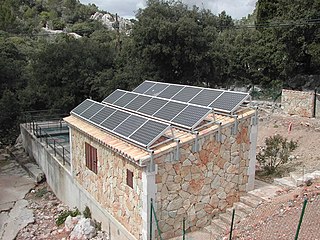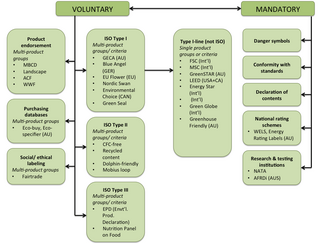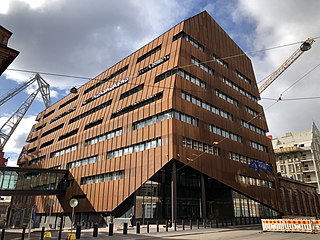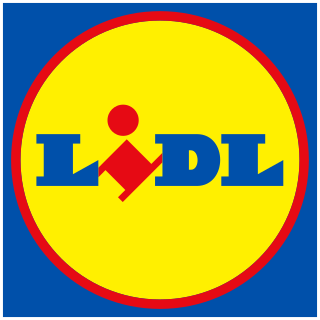
The United States Food and Drug Administration is a federal agency of the Department of Health and Human Services. The FDA is responsible for protecting and promoting public health through the control and supervision of food safety, tobacco products, caffeine products, dietary supplements, prescription and over-the-counter pharmaceutical drugs (medications), vaccines, biopharmaceuticals, blood transfusions, medical devices, electromagnetic radiation emitting devices (ERED), cosmetics, animal foods & feed and veterinary products.

Marmite ( MAR-myte) is a British savoury food spread based on yeast extract, invented by the German scientist Justus von Liebig. It is made from by-products of beer brewing (lees) and is produced by the British company Unilever. Marmite is a vegan source of B vitamins, including supplemental vitamin B12. A traditional method of use is to spread it very thinly on buttered toast.

In marketing, a product is an object, or system, or service made available for consumer use as of the consumer demand; it is anything that can be offered to a market to satisfy the desire or need of a customer. In retailing, products are often referred to as merchandise, and in manufacturing, products are bought as raw materials and then sold as finished goods. A service is also regarded as a type of product.
Crest is an American brand of toothpaste and other oral hygiene products made by American multinational Procter & Gamble (P&G) and sold worldwide. In many countries in Europe, such as Germany, Bulgaria, Serbia, Ukraine, Belarus, Russia, Poland, Hungary, Latvia, Romania, Estonia and Lithuania, it is sold as Blend-A-Med, the name of an established German toothpaste acquired by P&G in 1987. In France, Italy, Israel, Sweden, Finland, Argentina, Belgium, the Netherlands, Brazil, the United Kingdom, the Republic of Ireland, Australia, Nigeria, Greece, Uruguay and Colombia, P&G markets similar toothpaste formulations under the Oral-B brand.

A private label, also called a private brand or private-label brand, is a brand owned by a company, offered by that company alongside and competing with brands from other businesses. A private-label brand is almost always offered exclusively by the firm that owns it, although in rare instances the brand is licensed to another company. The term often describes products, but can also encompass services.

Giorgio Armani S.p.A., commonly known as Armani, is an Italian luxury fashion house founded in Milan by Giorgio Armani which designs, manufactures, distributes and retails haute couture, ready-to-wear, leather goods, shoes, accessories, and home interiors. Among others, Armani licenses its name and branding to Luxottica for eyewear and L'Oréal for fragrances and cosmetics. It is considered Italy's third-biggest fashion group behind Gucci and Prada.

Environment friendly processes, or environmental-friendly processes, are sustainability and marketing terms referring to goods and services, laws, guidelines and policies that claim reduced, minimal, or no harm upon ecosystems or the environment.

Ecolabels and Green Stickers are labeling systems for food and consumer products. The use of ecolabels is voluntary, whereas green stickers are mandated by law; for example, in North America major appliances and automobiles use Energy Star. They are a form of sustainability measurement directed at consumers, intended to make it easy to take environmental concerns into account when shopping. Some labels quantify pollution or energy consumption by way of index scores or units of measurement, while others assert compliance with a set of practices or minimum requirements for sustainability or reduction of harm to the environment. Many ecolabels are focused on minimising the negative ecological impacts of primary production or resource extraction in a given sector or commodity through a set of good practices that are captured in a sustainability standard. Through a verification process, usually referred to as "certification", a farm, forest, fishery, or mine can show that it complies with a standard and earn the right to sell its products as certified through the supply chain, often resulting in a consumer-facing ecolabel.

Hellmann's and Best Foods are American brand names that are used for the same line of mayonnaise, ketchup, mustard, sauce, salad dressing, condiments and other food products. They have been owned by the British multinational company Unilever since 2000. The Hellmann's brand is sold in the United States east of the Rocky Mountains; Latin America; Europe; Australia; the Middle East; Canada; India; and Pakistan. The Best Foods brand is sold in the United States west of the Rocky Mountains; in East Asia; Southeast Asia; Australia, and New Zealand.

The Blue Angel is an environmental label in Germany that has been awarded to particularly environmentally friendly products and services since 1978. The owner of the label is the Federal Ministry for the Environment, Nature Conservation, Building and Nuclear Safety.

The Hershey's Milk Chocolate Bar is a flagship chocolate bar manufactured by The Hershey Company. Hershey refers to it as "The Great American Chocolate Bar". The Hershey Milk Chocolate Bar was first sold in 1900.
Sigma-Aldrich is an American chemical, life science, and biotechnology company owned by the multinational chemical conglomerate Merck Group.

The European Chemicals Agency is an agency of the European Union working for the safe use of chemicals. It manages the technical and administrative aspects of the implementation of the European Union regulation called Registration, Evaluation, Authorisation and Restriction of Chemicals (REACH). ECHA is the driving force among regulatory authorities in implementing the EU's chemicals legislation. ECHA has to ascertain that companies comply with the legislation, advances the safe use of chemicals, provides information on chemicals and addresses chemicals of concern. It is located in Helsinki, Finland. ECHA is an independent and mature regulatory agency established by REACH. It is not a subsidiary entity of the European Commission.

Coop is one of Switzerland's largest retail and wholesale companies. It is structured in the form of a cooperative society with around 2.5 million members.

The Red Dot Design Award is an international, annual design competition for product and industrial design, brand and communication design as well as design concepts, in which the Red Dot quality label is awarded to winners. The Red Dot Design Award, which is organized by Red Dot GmbH & Co. KG, dates back to 1954 when the "Verein Industrieform e. V." was founded.

Krones AG is a German packaging and bottling machine manufacturer. It produces lines for filling beverages in plastic and glass bottles or beverage cans. The company manufactures stretch blow-moulding machines for producing polyethylene terephthalate (PET) bottles, plus fillers, labellers, bottle washers, pasteurisers, inspectors, packers and palletisers. This product portfolio is complemented by material flow systems and process technology for producing beverages for breweries, dairies and soft-drink companies.

Lidl is a German international discount retailer chain that operates over 12,000 stores, present in every member state of the European Union, Serbia, Switzerland, the United Kingdom and the United States. Headquartered in Neckarsulm, Baden-Württemberg, the company belongs to the Schwarz Group, which also includes hypermarket chain Kaufland.

Bayer AG is a German multinational pharmaceutical and biotechnology company and is one of the largest pharmaceutical companies and biomedical companies in the world. Headquartered in Leverkusen, Bayer's areas of business include: pharmaceuticals, consumer healthcare products, agricultural chemicals, seeds and biotechnology products. The company is a component of the EURO STOXX 50 stock market index.
Swissveg, previously known as the Swiss Association for Vegetarianism, is a Swiss association in the legal context of article 60ff of the Swiss civil code (SCC), where members are exclusively vegetarians. Swissveg runs campaigns, organizes events with the goal to reduce the consumption of animal products.

Vegan cheese is a category of non-dairy, plant-based cheese analogues. Vegan cheeses range from soft fresh cheeses to aged and cultured hard grateable cheeses like plant-based Parmesan. The defining characteristic of vegan cheese is the exclusion of all animal products.

















